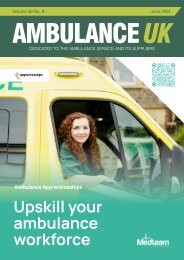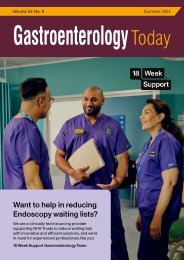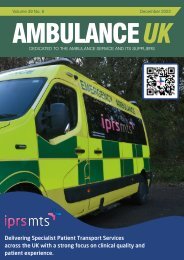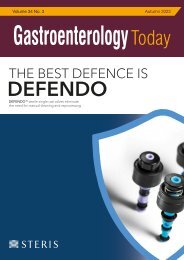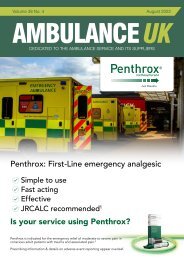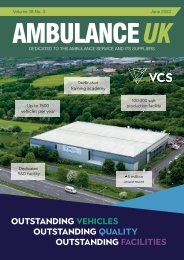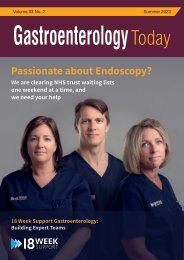Ambulance UK August 2022
Ambulance UK August 2022
Ambulance UK August 2022
You also want an ePaper? Increase the reach of your titles
YUMPU automatically turns print PDFs into web optimized ePapers that Google loves.
NEWSLINE<br />
SECAMB<br />
SECAmb begins<br />
rollout of upgraded of<br />
medicine dispensing<br />
machines<br />
South East Coast <strong>Ambulance</strong><br />
Service NHS Foundation Trust<br />
(SECAmb) has begun the<br />
rollout of a new generation of<br />
medicine-dispensing machines<br />
across its region.<br />
The new Omnicell, biometric,<br />
automated machines, are an<br />
upgrade to the original units first<br />
introduced in SECAmb in 2014<br />
and have been heralded for good<br />
medicine governance by the CQC.<br />
A total of 16 new dispensers are<br />
being installed at key sites across<br />
Kent, Surrey and Sussex.<br />
As part of this investment,<br />
the Trust is also rolling out an<br />
electronic medicines governance<br />
system which includes electronic<br />
controlled drugs register at its<br />
sites which cannot host the larger<br />
Omnicell units – a move which will<br />
potentially see SECAmb become<br />
the first ambulance trust in the<br />
country to eliminate paper-based<br />
controlled drugs’ registers.<br />
Clinicians will be able to use a<br />
dedicated Omnicell technology<br />
app, MedX, to log their<br />
management of medicines and<br />
allow SECAmb to trace and<br />
maintain good stock management<br />
and auditing of medicines<br />
including controlled drugs.<br />
Chief Pharmacist Carol-Anne<br />
Davies-Jones said: “I’m absolutely<br />
delighted to see these automated<br />
cabinets being installed. They will<br />
ensure the continued safety and<br />
good governance of our controlled<br />
drugs (CDs) and medicines.<br />
“By introducing the new software<br />
at sites which have previously not<br />
had the benefit of controlled drug<br />
electronic registry, we are freeing<br />
up clinicians’ time from manual<br />
stock management and auditing<br />
work – meaning they can spend<br />
more time attending to patients<br />
and supporting their colleagues.<br />
There are also financial benefits<br />
and environmental benefits to<br />
going paperless.<br />
“Our Medicine Governance Team<br />
has done a fantastic job in making<br />
this happen and I would like to<br />
thank them for their hard work in<br />
delivering this important piece of<br />
work.”<br />
<strong>Ambulance</strong> calls<br />
almost double to 14<br />
million since 2010,<br />
GMB analysis shows<br />
Pressures ‘worst ever’ as<br />
demand rises ten times faster<br />
than number of ambulance<br />
workers, says GMB Union<br />
<strong>Ambulance</strong> calls have almost<br />
doubled to 14 million a year since<br />
2010, GMB analysis shows.<br />
In the financial year 2009/10 there<br />
were 7.9 million callouts, according<br />
to published NHS data. [1]<br />
But by 2021/22 the number<br />
had rocketed to 14 million – an<br />
increase of 77 per cent. This was<br />
ten times faster than the increase<br />
in ambulance workers (up 7 per<br />
cent) over the same period.<br />
<strong>Ambulance</strong> workers staged a<br />
demonstration outside GMB’s<br />
annual congress, which began in<br />
Harrogate, Yorkshire on June <strong>2022</strong>.<br />
The increase in pressures on<br />
ambulance workers are the result<br />
of cuts to other health and care<br />
services, GMB said.<br />
“The explosion in demand is<br />
due to savage cuts to essential<br />
services since 2010.<br />
“GMB members tell us the<br />
pressures they face are the worst<br />
they have ever experienced.<br />
“Our members face unbelievable<br />
stress and even abuse while they<br />
do their best to administer care<br />
and save lives.<br />
“We need urgent investment<br />
across the health and care<br />
services, otherwise we risk an<br />
unprecedented crisis.”<br />
[1] <strong>Ambulance</strong> call volumes in<br />
England (millions)<br />
Total Of which,<br />
<strong>Ambulance</strong> 111 calls<br />
calls transferred<br />
2009/10 7.9 -<br />
2010/11 8.1 -<br />
2011/12 8.2 0.1<br />
2012/13 8.5 0.2<br />
2013/14 8.5 0.8<br />
2014/15 9 1.1<br />
2015/16 9.4 1.3<br />
2016/17 9.8 1.5<br />
2017/18 8.6 1.6<br />
2018/19 11.7 1.7<br />
2019/20 12.4 1.8<br />
2020/21 11.4 1.9<br />
2021/22 14 2.5<br />
The average response time for<br />
serious (Category 2) calls was 51<br />
minutes in April <strong>2022</strong>, compared to<br />
twenty minutes a year before. [2]<br />
Meanwhile, more than a thousand<br />
ambulance workers have left their<br />
jobs since 2018 to seek a better<br />
work life balance, better pay, or to<br />
take early retirement. [3]<br />
Rachel Harrison, GMB National<br />
Officer, said:<br />
“<strong>Ambulance</strong> workers have faced<br />
more than a decade of cuts while<br />
demand has almost doubled.<br />
“It’s no wonder they are leaving in<br />
droves while the service itself is<br />
teetering on the brink of collapse.<br />
For the latest <strong>Ambulance</strong> Service News visit: www.ambulancenewsdesk.com<br />
Sources:<br />
National Audit Office, NHS <strong>Ambulance</strong><br />
Services, 26 January 2017, Figure 3,<br />
page 13;<br />
NHS England, <strong>Ambulance</strong> Quality<br />
Indicators (old and new AmbSYS<br />
timeseries);<br />
NHS England, NHS 111 Minimum Data<br />
Set;<br />
NHS England, Integrated Urgent Care<br />
Aggregate Data Collection (IUCADC<br />
including NHS111) from April 2021.<br />
[2] NHS England, <strong>Ambulance</strong> Quality<br />
Indicators, 12 May <strong>2022</strong> https://www.<br />
england.nhs.uk/statistics/statistical-workareas/ambulance-quality-indicators/<br />
[3] NHS Digital, HCHS staff by reason<br />
for leaving, staff group and region,<br />
April 2018 to September 2021, 09<br />
February <strong>2022</strong> https://digital.nhs.uk/<br />
supplementary-information/<strong>2022</strong>/reason-<br />
for-leaving-by-staff-group-and-region-<br />
2018-to-2021<br />
AMBULANCE <strong>UK</strong> - AUGUST<br />
135



